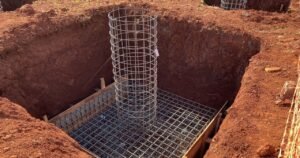Are you building a bridge or a high-rise that needs maximum durability, strength and resistance to natural elements? High-strength concrete is the answer! It has a compressive strength greater than 40 MPa so you can count on it to give your structure the longevity it needs. But before you grab your cement mixer and shovels, injectors and drills, there are some important pros and cons of this material you should know about first. In this article we’ll cover them all – from cost to application process – so read on for everything you need to know about using high-strength concrete in construction projects!
What is High-Strength Concrete and Why Should You Care About It
Hey there! So, you might have heard about high-strength concrete. Now, before you start yawning, let me tell you, this stuff is seriously impressive! It’s basically concrete that’s been engineered to pack a punch – we’re talking at least two or three times stronger than regular concrete. And why should you care? Well, whether you’re building a towering skyscraper or simply a backyard BBQ pit, high-strength concrete can help ensure your project is sturdy, durable, and long-lasting. Plus, let’s be honest, who doesn’t want to brag about having used concrete that’s tougher than their ex’s heart?
Advantages of High-Strength Concrete
So, have you heard about this high-strength concrete? I’m not talking about your average Joe concrete. No, this stuff is built like a tank! And let me tell you, the benefits are no joke. First off, it’s super durable, so you won’t have to worry about any of those pesky cracks forming, which means less money spent on repairs. Plus, it’s able to withstand some serious weight, making it perfect for tall buildings and bridges. But the best part? Its strength means you can use less of it, which saves you money and is better for the environment. So, if you ever need to build something tough, consider giving high-strength concrete a chance. Trust me, it’s a real powerhouse.
Disadvantages of High-Strength Concrete
Hey there, have you ever heard of high-strength concrete? Yeah, it can support a ton of weight and withstand intense pressure, but let’s be real here, it’s not all sunshine and rainbows. As much as we’d love to believe that there’s a perfect solution to everything, there are always drawbacks. For one, the cost of high-strength concrete is astronomical. You might as well take out a second mortgage on your house if you’re thinking about using it for a project. And let’s not forget how difficult it is to work with. We’re talking cranes, heavy machinery, and a lot of sweat and tears. So yeah, while high-strength concrete definitely has its perks, don’t be fooled by its toughness. It comes at a price.
Tips on Choosing the Right Type of Concrete for Your Project
Choosing the right type of concrete can be a daunting task, but fear not, my friend! With a little bit of guidance, you can make the selection process a breeze. First things first, consider the location and climate of your project. Will it be exposed to extreme weather conditions? If so, go for a durable and weather-resistant type of concrete. Next, think about the intended use of your project. Will it be a driveway, patio, or swimming pool? Each requires a different type of concrete. And finally, don’t forget to match the aesthetics. If you want your project to look like a million bucks, opt for decorative concrete. So, there you have it, folks. Don’t let the selection process stress you out. With a little bit of knowledge and a lot of humor, you’ll choose the perfect type of concrete for your project in no time!
4 Easy Ways to Enhance the Durability of Your Structure With High-Strength Concrete
Building structures can be tough and expensive work. Nobody wants to spend a ton of money on a project and then have something break or wear out soon after it’s completed. That’s where high-strength concrete comes in! By enhancing the durability of your structure with this amazing material, you’re ensuring that it will stand the test of time. But how can you do that in an easy way? Lucky for you, there are some simple tricks you can try: using reinforcing steel, reducing water in the mix, curing the concrete properly, and using a quality sealer. These tips might seem small, but they can make a big difference when it comes to the longevity of your structure. Plus, who doesn’t want to feel like a concrete pro?
The Best Practices to Follow When Working With High-Strength Concrete
Dealing with high-strength concrete can be tough and intimidating. It’s like trying to tame a wild beast. But fear not, my friend! You can handle it with just a few best practices. First, make sure to use the right tools, because taking a hammer to it won’t get you too far. Second, keep the concrete moist during the curing process, because nobody likes a dry and flaky mess. Lastly, pay attention to the strength requirements and mix proportions, because otherwise the results can be catastrophic. Follow these practices and you’ll be a high-strength concrete expert in no time! And who knows, maybe you’ll even impress your friends at the next barbecue with your newfound skills.
In the end, high-strength concrete is an excellent material to use in a variety of projects due to its high compression strength and variety of advantages. From bridges and leaning towers to driveways, this form of concrete can conquer many projects if given the right oversight. No matter what you are building or repairing, following these tips can help ensure that your structure is set up for long-term success. Remember to take time researching the type of concrete you will be using, as well as constructing a plan for how it will be implemented. By taking these precautions, you’ll be better prepared to produce an amazing final product with a combination of skill and expertise plus the unmatched power of high-strength concrete.





